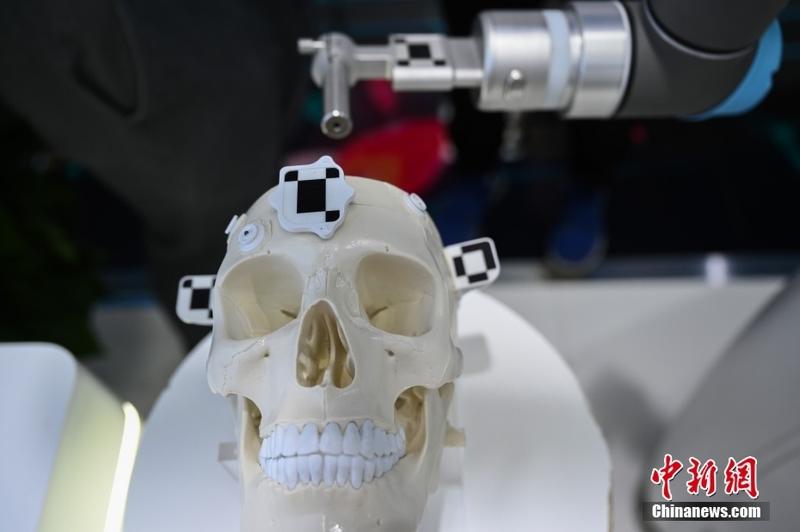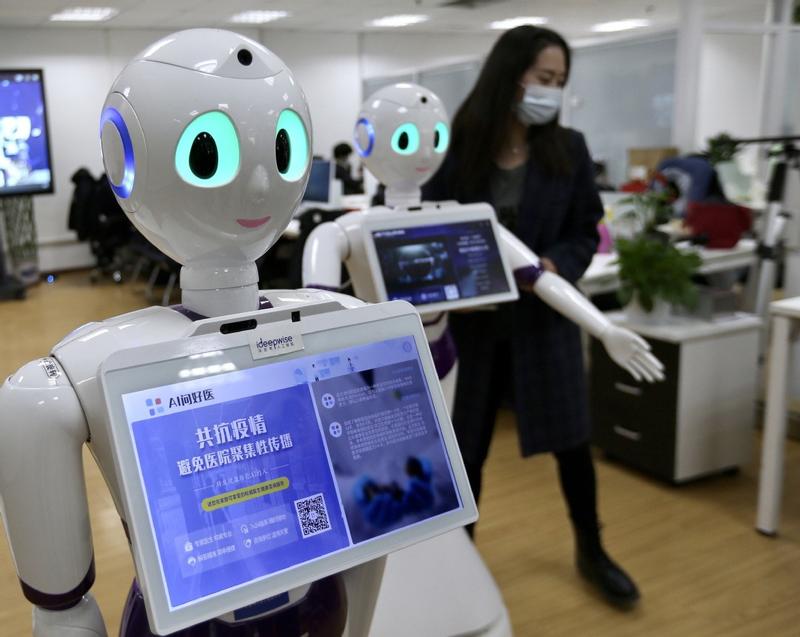 A neurosurgical robot conducts simulated operation at the China International Fair for Trade in Services in Beijing, on Sept 3, 2021. (PHOTO / CHINA NEWS SERVICE)
A neurosurgical robot conducts simulated operation at the China International Fair for Trade in Services in Beijing, on Sept 3, 2021. (PHOTO / CHINA NEWS SERVICE)
In a milestone for China's artificial intelligence efforts, a team of scientists from Huazhong University of Science and Technology was named co-champion of this year's prestigious Graph Challenge, a global computing competition that involves machine learning, high performance computing and visual analytics.
It was the first time that Chinese scientists were awarded the top prize since the competition's launch in 2017.
The event was hosted by the Institute of Electrical and Electronics Engineers, the Massachusetts Institute of Technology and Amazon, all of which are in the United States. The other co-champion was a US-based team.
The Chinese team's solution to solving an extremely esoteric reasoning task during the competition will accelerate the efficiency and application of artificial intelligence, according to a statement released on Aug 16 by the university, which is in Wuhan, capital of Hubei province.
In a speech addressing China's top scientists and engineers in May, President Xi Jinping urged the Chinese scientific community to break new ground in four strategic frontiers, one of which is "deep blue".
Deep blue refers to fields related to computer science and information technology, such as cyberspace security, artificial intelligence and quantum computing, according to the Ministry of Science and Technology.
Over the past decade, 521,264 patent applications related to AI technology were submitted worldwide, of which China contributed 389,571, or 74.7 percent, according to Tsinghua University's 2020 Report on Artificial Intelligence Development, which was released in April.
 An online health consultancy platform is in operations in March in the Haidian district of Beijing. (ZOU HONG / CHINA DAILY)
An online health consultancy platform is in operations in March in the Haidian district of Beijing. (ZOU HONG / CHINA DAILY)
Also in the past decade, natural language processing, machine learning, information retrieval and recommendation, and computer vision-the enabling of computers and systems to interpret and understand digital images-were the most influential AI technologies worldwide, the report said. In the next decade, AI will likely see major developments in fields such as enhanced learning, knowledge graphing and smart robotics.
China is among global front-runners in terms of publishing scientific papers for more than 10 AI-related fields, including natural language processing, AI chip technology, machine learning and information retrieval and recommendation.
China's strongest AI fields are multimedia and the internet of things, in which it ranks first in the world in terms of academic output. However, it is noticeably behind other AI powerhouses, such as the US, when it comes to human-computer interaction, robotics, computing theory and computer graphics.
The US currently has the world's largest talent pool of renowned AI experts, accounting for over 62 percent of the global total, the report said. It has over six times more than China, which is ranked second globally.
Gong Ke, the executive president of the Chinese Institute of New Generation Artificial Intelligence Development Strategies, said at a public forum in July that China will need to cultivate a group of quality scientists who can develop core technologies in artificial intelligence.
"Education about AI should be shared with everybody," he said, adding that it is crucial to combine theoretical learning with hands-on practice when learning the subject, and attention should be paid to social ethics and responsibility when creating AI applications.
 A model of the quality control equipment inserted with Huawei Shengteng AI chip is shown at the China International Fair for Trade in Services in Beijing, on Sept 3, 2021. (PHOTO / CHINA NEWS SERVICE)
A model of the quality control equipment inserted with Huawei Shengteng AI chip is shown at the China International Fair for Trade in Services in Beijing, on Sept 3, 2021. (PHOTO / CHINA NEWS SERVICE)
Quantum progress
Another deep blue field that is emerging in China is quantum information technologies-applications that harness the peculiar properties of matter at the atomic level to achieve astonishing feats in communication and computing.
In 2016, China launched Micius, the world's first quantum communications satellite. The achievement marked a major milestone in space-based quantum communication that is theoretically hack-proof, which could be significant in the government, finance and defense sectors.
Given its strategic importance, nations such as the US, Japan, India and some European countries are racing to develop comparable technologies, according to the journal Nature.
In January, Pan Jianwei, who is recognized as China's top quantum scientist, announced that his team had created the world's largest integrated space-to-ground quantum network, which can provide ultrasecure communication between over 150 users over a total distance of 4,600 kilometers across China, according to a study published in the journal Nature.
Reviewers of the study hailed the achievement as "impressive" and "futuristic", as it represents a major step toward building a practical, large-scale quantum internet.
Pan said at a public event in July that humanity has entered the second quantum revolution, characterized by scientists actively manipulating the delicate quantum states of particles for practical applications instead of just passively observing them.
Two of the biggest challenges for modern information technologies are data security and a lack of computing power, which can be solved with new quantum machines, he said.
The computing power of quantum computers can grow exponentially as the number of controllable quantum bits increases. Unlike classical computer bits, which present data as either a 0 or a 1, quantum bits, or qubits, can exist in a superposition that allows them to represent a 0 or a 1 at the same time.
As a result, quantum machines can take computational shortcuts when simulating extremely complex scenarios, whereas conventional computers have to bulldoze their way to a solution, taking significantly more time in the process.
In December, the journal Science reported that Pan and his team had created the world's first light-based prototype quantum computer, called Jiuzhang. It can perform an extremely difficult calculation known as Gaussian boson sampling in 200 seconds. The same task would take the world's fastest classical supercomputer, Fugaku, around 600 million years.
Pan has said that Jiuzhang's number of manipulable qubits has been increased from 76 to 113, thus boosting its computing power by at least 10 orders of magnitude.
Pan said this astonishing computing power can be used in cryptography, weather forecasting, financial analysis, drug design and running simulations for chemistry and materials science.
However, current quantum machines are still prone to external interference and typically excel only in highly specific tasks.
"We hope to achieve coherent manipulation of millions of qubits over the next decade, thus laying the foundation for a general-purpose quantum computer," he said.


